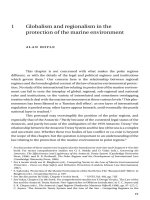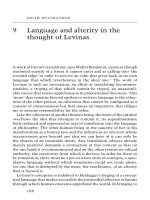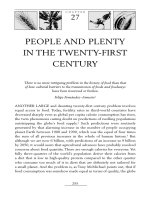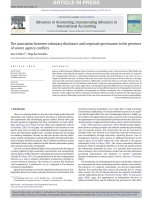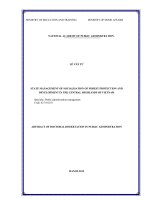Globalism and regionalism in the protection of the marine environment
Bạn đang xem bản rút gọn của tài liệu. Xem và tải ngay bản đầy đủ của tài liệu tại đây (100.53 KB, 15 trang )
1 Globalism and regionalism in the
protection of the marine environment
This chapter is not concerned with what makes the polar regions
different, or with the details of the legal and political regimes and institutions
which govern them.
1
Our concern here is the relationship between regional
regimes and the broader global context of the law of marine environmental protec-
tion. No study of the international law relating to protection of the marine environ-
ment can fail to note the interplay of global, regional, sub-regional and national
rules and institutions, or the variety of interrelated and sometimes overlapping
treaties which deal with the marine environment at these various levels.
2
This phe-
nomenon has been likened to a ‘Russian doll effect’: as one layer of international
regulation is peeled away, other layers appear beneath, until eventually the purely
national layer is reached.
3
This portrayal may oversimplify the position of the polar regions, and
especiallythat of the Antarctic.
4
Partlybecause of the contested legal status of the
Antarctic, and partlybecause of the ambiguities of the 1959 Antarctic Treaty,
5
the
relationship between the AntarcticTreatySystemand the law of the sea is a complex
and uncertain one. Whether these two bodies of law conflict or co-exist is beyond
the scope of this chapter, but the question is important to an understanding of the
law relating to the protection of the marine environment in polar regions.
6
19
1
For discussion of these matters see in particular the Introductory overview and Chapters 4–6 in this
book. For recent comprehensive studies see O. S. Stokke and D. Vidas (eds.), Governing the
Antarctic: The Effectiveness and Legitimacy of the Antarctic Treaty System (Cambridge University
Press, 1996); and D. R. Rothwell, The Polar Regions and the Development of International Law
(Cambridge University Press, 1996).
2
For a recent study see H. Ringbom (ed.), Competing Norms in the Law of Marine Environmental
Protection – Focus on Ship Safety and Pollution Prevention (London: Kluwer Law International,
1997).
3
S. Sadowski, ‘Protection of the Marine Environment of the North Sea: The “Russian Doll” Effect’, in
Ringbom (ed.), Competing Norms, p. 109.
4
See the discussion byVidas, Chapter 4 in this book.
5
UNTS, Vol. 402, pp. 71ff.
6
See Vukas, Chapter 2 in this book. For comprehensive studies see F. Orrego Vicuña, ‘The Law of the
Sea and the Antarctic Treaty System: New Approaches to Offshore Jurisdiction’, in C. C. Joyner and
S. K. Chopra (eds.), The Antarctic Legal Regime (Dordrecht: Martinus Nijhoff, 1988), pp. 97–127; C.
C. Joyner, ‘The Antarctic Treaty System and the Law of the Sea – Competing Regimes in the
Whether regional regimes are part of or separate from a global framework
of regulation is but one aspect of the relationship between global, regional and sub-
regional approaches to protection of the marine environment. More important for
policy-makers is to have an understanding of the comparative advantages and dis-
advantages of global or regional approaches when deciding whether to regulate
and how to do so. Both the Arctic and Antarctic illustrate well the sometimes
difficult choices which may have to be made between these different levels of inter-
national protection. Decision-makers must deal not only with the question
whether to initiate action at a regional or sub-regional level, rather than at a global
level: they must also consider what constitutes a ‘region’ or ‘sub-region’. The variety
of answers to this basic question reflects both the diversity of state practice, and the
complexity of international legal and political responses to the problems of pro-
tecting and preserving the marine environment. That is the theme which this
chapter will address.
Regionalism in the pre-UNCLOS III law of the sea
The law of the sea is inherently global. The International Law Com-
mission assumed as much in its codification of the subject in the 1950s; and the
words ‘region’ and ‘regional’ appear only twice in the four Geneva Conventions of
1958.
7
Nor has there been any suggestion in the case law of the International Court
of Justice that it is applying local or regional customary law when adjudicating law
of the sea disputes. While the Court’s decisions do take account of special circum-
stances, such as geography or dependence on fisheries,
8
and naturally pay partic-
ular attention to the practice of the parties in dispute, the Court has always been
careful to articulate its conclusions in terms of a general law of the sea applicable
to all states. The Court’s general approach suggests that, while there may be, for
example, a Latin American perspective on the law of the sea, or Latin American
20 Alan Boyle
Footnote 6 (cont.)
Southern Ocean?’, International Journal of Marine and Coastal Law, Vol. 10, 1995, pp. 301–31; D.
Vidas, ‘The Antarctic Treaty System and the Law of the Sea: A New Dimension Introduced by the
Protocol’, in Stokke and Vidas (eds.), Governing the Antarctic, pp. 61–90; and T. Scovazzi, ‘The
Antarctic Treaty System and the New Law of the Sea: Selected Questions’, in F. Francioni and T.
Scovazzi (eds.), International Law for Antarctica, 2nd edn (The Hague: Kluwer Law International,
1996), pp. 377–94.
7
See Art. 4(4) of the Convention on the Territorial Sea and the Contiguous Zone (straight baselines)
and Art. 12(2) of the Convention on the High Seas (search and rescue); these conventions are pub-
lished in UNTS, Vol. 516, pp. 205ff and UNTS, Vol. 450, pp. 82ff, respectively. See J. Crawford,
‘Universalism and Regionalism from the Perspective of the Work of the International Law
Commission’, in International Law on the Eve of the Twenty First Century: Views from the
International Law Commission (New York: United Nations, 1997), p. 99.
8
See, e.g., Fisheries (United Kingdom v. Norway), ICJ Reports 1951, p. 116; Fisheries Jurisdiction
(United Kingdom v. Iceland; Federal Republic of Germany v. Iceland), ICJ Reports 1974, pp. 3 and
175; North Sea Continental Shelf (Federal Republic of Germany/Denmark; Federal Republic of
Germany/Netherlands), ICJ Reports 1969, p. 3.
practice contributing to the development of the law of the sea,
9
there can be no
Latin American law of the sea distinct from what prevails elsewhere.
Regionalism in the LOS Convention
The 1982 United Nations Convention on the Law of the Sea
10
presents a
more complex picture, however. On the one hand its explicit purpose is to articu-
late a comprehensive, uniform and global legal order for the world’s oceans, and it
seeks to sustain that legal order in several ways. Article 309 prohibits reservations
and thus compels states to make an ‘all or nothing’ choice when deciding whether
to become a party to the Convention. Article 311 gives the Convention pre-
eminence over other agreements; it specifically limits the freedom of parties to
create new agreements which are incompatible with the effective execution of the
object and purpose of the Convention or which affect either the application of ‘the
basic principles embodied herein’ or the rights and obligations of other parties.
This article thus provides a significant constraint on the making of regional agree-
ments by parties to the LOS Convention. At the same time, Article 237 specifically
preserves the freedom of states to make further agreements relating to the protec-
tion and preservation of the marine environment, provided these are ‘concluded in
further
ance of the general principles and objectives of this Convention
’. The same
article also preserves obligations under existing agreements on the marine
environment, but requires them to be ‘carried out in a manner consistent with the
general principles and objectives’ of the LOS Convention.
Moreover, Part XV of the Convention subjects disputes concerning the
interpretation or application of the Convention to compulsory, binding dispute
settlement. Although there are certain exceptions to this principle, disputes con-
cerning the Convention’s articles on protection of the marine environment will
generally fall within the requirement of compulsory settlement.
11
Regional agree-
ments which derogate from the Convention in violation of Articles 237 or 311
would therefore be open to unilateral challenge by other states parties in one or
other of the various fora on which the Convention confers jurisdiction.
The C
onvention is thus equipped with strong and sophisticated mecha-
nisms intended to preserve its integrity and universality. On the other hand, while
recognising that the problems of ocean space are ‘closely interrelated’ and ‘need to
Globalism and regionalism 21
19
See F. C. Garcia-Amador, ‘Latin America and the Law of the Sea’, in L. M. Alexander (ed.), The Law
of the Sea: A New Geneva Conference. Proceedings of the 6th Annual Conference of the Law of the
Sea Institute, Kingston, Rhode Island, 21-24 June 1971 (Kingston, RI: University of Rhode Island,
Law of the Sea Institute, 1972); A. Szekely, Latin America and the Development of the Law of the
Sea, 2 vols. (Dobbs Ferry, NY: Oceana, 1976); F. Orrego Vicuña (ed.), The Exclusive Economic Zone:
A Latin American Perspective (Boulder, CO: Westview Press, 1984).
10
Text reprinted in ILM, Vol. 21, 1982, pp. 1,261ff.
11
See A. E. Boyle, ‘UNCLOS, the Marine Environment and the Settlement of Disputes’, in Ringbom
(ed.), Competing Norms, pp. 241–56. Vukas, Chapter 2 in this book, takes a more cautious view of
the extent to which environmental disputes fall within compulsory jurisdiction. On this question,
as on others, Art. 297 of the LOS Convention is far from clear.
be considered as a whole’,
12
the Convention is replete with references to regional
rules, regional programmes, regional cooperation and so on. It makes specific pro-
vision for regional cooperation in the case of enclosed and semi-enclosed seas.
13
Moreover, in the case of fisheries management, regional cooperation and regula-
tion are required if the provisions of the Convention
14
and the 1995 Implementing
Agreement on Straddling and Highly Migratory Fish Stocks
15
are to be imple-
mented effectively. Part XII of the Convention, dealing with protection of the
marine environment, also makes significant reference to regional rules and stan-
dards in various contexts.
It is clear therefore that a global law of the sea can accommodate regional
approaches to certain problems, including protection of the marine environment.
There will be no necessary incompatibility with the LOS Convention, provided any
regional arrangements are consistent with the object and purpose of the
Convention as set out in Articles 237 and 311, and provided they comply with the
framework for regulation of the marine environment established by Part XII.
Regionalism in Part XII of the LOS Convention
The interplay between globalism and regionalism in the law of the sea is
at its most evident and most complex in Part XII of the LOS Convention. There is
no doubt that the fundamental elements of the law of the marine environment –
both conventional and customary – are found in these articles of the Convention.
They not only build on pre-existing law, including prior regional agreements such
as the Baltic and Mediterranean Conventions of 1974 and 1976, respectively,
16
but
have provided the basis for subsequent developments, whether at global, regional
or national level. There are important linkages between this part of the Convention
and other, sectoral, treaties dealing with the marine environment, including the
1972 Convention on the Prevention of Marine Pollution by Dumping of Wastes and
Other Matter (London [Dumping] Convention) and its successor Protocol of
1996,
17
as well as the 1973 International Convention for the Prevention of Pollution
from Ships, as modified by the Protocol of 1978 (MARPOL 73/78)
18
and other IMO
conventions. Part XII also provided the framework for Chapter 17 of Agenda 21 of
the Report of the 1992 Rio Conference on Environment and Development, and is
specifically referred to in that report as representing the international law on the
subject.
19
If that view is correct, then it is not merely regional arrangements
22 Alan Boyle
12
See the Preamble to the LOS Convention.
13
Arts. 122–123 of the LOS Convention. See the further discussion byVukas, Chapter 2 in this book.
14
Arts. 61–70 and 116–120.
15
Text reprinted in ILM, Vol. 34, 1995, pp. 1,547ff.
16
For those two conventions see below in this chapter.
17
ILM, Vol. 11, pp. 1,291ff (Convention); ILM, Vol. 36, 1997, pp. 7ff (Protocol).
18
ILM, Vol. 12, 1973, pp. 1,319ff (Convention); and ILM, Vol. 17, 1978, pp. 546ff (Protocol).
19
Report of the UN Conference on Environment and Development, Annex II, Agenda 21, Chapter 17,
para. 1, UN doc. A/CONF.151/26/Rev.1, Vol. 1; see U. Beyerlin, ‘New Developments in the
Protection of the Marine Environment: Potential Effects of the Rio Process’, Zeitschrift für aus-
ländisches öffentliches Recht und Völkerrecht, Vol. 55, 1995, p. 544; P. W. Birnie and A. E. Boyle,
between parties to the Convention which must comply with the constraints of Part
XII: so must regional arrangements between non-parties, who will be bound as a
matter of customary law.
20
While setting out a global framework of rules and principles governing
marine pollution and the protection of marine ecosystems, Part XII also reflects a
pragmatic acceptance that, in certain instances, regional approaches will be nec-
essary or more appropriate even within a broadly uniform and comprehensive
global legal order. It does, however, treat different sources of pollution differently
in this respect. Within the global framework, two contrasting models of regional-
ism can be noted – one restrictive, the other more liberal.
The restrictive model of regionalism
This model is exemplified by the provisions of the LOS Convention on
dumping at sea and pollution from ships.
21
Here the function of regional rules or
treaties is relatively limited: it is to reinforce enforcement and application of the
global rules found in the LOS Convention itself and in the 1972 London Convention
and MARPOL 73/78. These latter conventions are also global in scope; neither
permits r
egional derogation or the separate adoption of lower regional standards.
Their purpose is to provide international minimum standards, especially for flag
states, and the LOS Convention articles largely serve to reinforce this objective.
At the same time, some elements of regionalism are permissible even
here. Although dumping at sea is now globally almost entirely prohibited,
22
regional treaties had for some time been more stringent than was required by the
1972 London Convention in its original form.
23
Neither the LOS C
onvention nor the
London Convention in any way limits the freedom exercised by states to impose
additional controls on dumping in response to the environmental circumstances
of certain regional seas, including those, such as the Baltic, that are shallow and
semi-enclosed.
The scope for regionalism with regard to pollution from ships is neces-
sarily more limited. In the interests of freedom of navigation, MARPOL 73/78 is
not merely a minimum standard for flag states, it is also a maximum standard for
exclusive economic zone regulation by coastal states.
24
There is some room for
Globalism and regionalism 23
International Law and the Environment (Oxford: Clarendon Press, 1992), pp. 251–99; and A.
Yankov, ‘The Law of the Sea Convention and Agenda 21: Marine Environmental Implications’, in
A. E. Boyle and D. Freestone (eds.), International Law and Sustainable Development: Past
Achievements and Future Challenges (Oxford: Clarendon Press, 1999), pp. 271–96.
20
North Sea Continental Shelf, p. 3. On Part XII of the LOS Convention and customary law see the
discussion byVukas, Chapter 2 in this book.
21
Arts. 210 and 211 of the LOS Convention.
22
See the 1996 Protocol to the 1972 London Convention.
23
See the 1972 Oslo Convention for the Prevention of Marine Pollution by Dumping from Ships and
Aircraft (ILM, Vol. 11, 1972, pp. 262ff); the 1974 Helsinki Convention on the Protection of the
Marine Environment of the Baltic Sea Area (ILM, Vol. 13, 1974, pp. 546ff); the 1976 Barcelona
Protocol for the Prevention of Pollution of the Mediterranean Sea by Dumping from Aircraft and
Ships (ILM, Vol. 15, 1976, pp. 300ff); and the 1986 Noumea Protocol for the Prevention of Pollution
by Dumping (ILM, Vol. 26, 1987, pp. 38ff).
24
LOS Convention, Art. 211(5).
additional regional action, however. MARPOL 73/78 itself provides for stricter dis-
charge rules in designated special areas,
25
while the LOS Convention does not
prevent coastal states from exercising some control over navigation in environ-
mentally sensitive areas,
26
or the exercise of port state control over compliance
with international rules and standards.
27
Article 234 of the LOS Convention also
permits additional measures to be taken nationally or regionally to control pollu-
tion from ships in ice-covered areas, while Article 211(6) allows for other special
areas to be designated by IMO. Under this article IMO has a special responsibility
for ensuring that regional or national action affecting navigation falls within the
narrow boundaries of acceptability under the LOS Convention and its own conven-
tions. It is really only under Article 234 that there is a significant autonomous dis-
cretion conferred on coastal states. The full implications of this article are further
considered below, in several other chapters of this book.
28
The liberal model of regionalism
The more liberal approach is found in the LOS Convention’s articles on
land-based (including airborne) sources of pollution, and in the practice of states
on these. Here, although the negotiation of global r
ules and standards is encour-
aged by its Articles 207 and 212, no attempt is made in the LOS Convention either
to impose a uniform global standard comparable to that for ships, or even a
minimum standard comparable to that for dumping at sea. Indeed, no such global
standards exist for land-based or airborne pollution, nor are they likely to be
agreed, given the great diversity of sources and the widely differing socio-economic
priorities of states when asked to control pollution originating in industrial and
agricultural activities. Instead, states are free to set their own standards of regula-
tion, provided only that these meet the more general requirements of Article 194 of
the LOS Convention. Briefly, this article requires states to take ‘all measures con-
sistent with this Convention that are necessary to prevent, reduce and control
pollution of the marine environment from any source, using for this purpose the
best practicable means at their disposal’. These measures must minimise to the
fullest extent the release of toxic, harmful or noxious substances. States are free to
take such measures nationally or jointly, including regionally, as they deem
appropriate.
In practice, international action to tackle these sources of pollution
remains almost entirely regional. Prior to the 1992 Rio Confer
ence, no agreement
could be reached on a stronger global approach to land-based marine pollution.
24 Alan Boyle
25
Annex I, Regulations 9 and 10.
26
See generally International Journal of Marine and Coastal Law, Special Issue on Particularly
Sensitive Sea Areas, Vol. 9, 1994.
27
See LOS Convention, Art. 218, which provides for port state jurisdiction over pollution offences at
sea. See also below in this chapter.
28
See especially Vukas, Chapter 2; Rothwell and Joyner, Chapter 7; and Brubaker, Chapter 10 in this
book.

